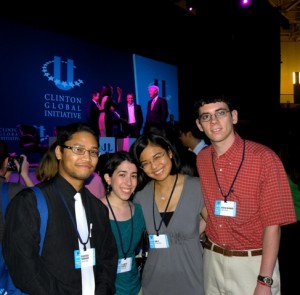
Ashutosh Tamrakar ’12, from left, Elizabeth Engoren ’12, Nan Li ’12 and Austin Weidner ’12 at the Clinton Global Initiative University conference.
Not far from the well-developed and modern city of Kingston, Jamaica’s rural areas lack basic infrastructure such as paved roads and even running water. Because of the widespread poverty, banks do not have any incentive to set up branches there. Without banks nearby, villagers must make a day-long trek to a city where they can cash their paychecks.
But the solution to this problem could be in those villagers’ pockets. Cell phone ownership is common, even among poor Jamaicans, opening an opportunity to establish a mobile banking system. And that is just what a group of Lafayette students wants to help do.
The interdisciplinary team is comprised of Elizabeth Engoren ’12 (Toledo, Ohio), a chemical engineering major; Nan Li ’12 (Shanghai, China), a double major in economics and international affairs; Ashutosh Tamrakar ’12 (Kathmandu, Nepal), a dual major in chemical and biomolecular engineering and art; and Austin Weidner ’12 (Kutztown, Pa.), a civil engineering major. Michael Kelly, assistant professor of economics, and David Veshosky, associate professor of civil and environmental engineering, are serving as faculty advisers.
Last semester, the students attended the Clinton Global Initiative University (CGI U) meeting in San Diego, where they networked with private organizations and other student projects and came back inspired and motivated to move forward with their project. The CGI U conference hosts a series of workshops and plenary discussions designed to prepare students with the tools necessary to implement their projects.
“To be a part of the conference was just like getting a massive boost of inspiration. CGIU had a refreshing, forward focus on students that certainly helped us funnel our energy and enthusiasm into commitments,” says Tamrakar, “I think it helped our entire team recognize opportunities to use our education in ways that really makes a difference in the world. Moreover, it was simply incredible to have an opportunity to interact with leaders in the national/international entrepreneurial field and receive encouragements and advice from them.”
Mobile banking is a system that allows users to receive money and pay for goods through a text message based interface using only their cell phones, much like a credit card. This system has been used extensively in Haiti, South Africa, and Tanzania with great success.
The students are looking to facilitate the establishment of a mobile banking service network in the rural Hagley Gap region of Jamaica. They plan to mediate the negotiation process between banks, telecommunications companies, government policy makers and customers, with the goal of producing a legal contract that will ensure the implementation and conversion of necessary infrastructure.
The main objective of the mobile banking project is to implement a regional mobile banking system, which will give rural Jamaicans a liquid and secure form of money, thus creating an environment for economic empowerment.
Engoren says that working on this project is helping her focus her career goals.
“Because I am still deciding between technical and policy graduate programs, our mobile banking project allows me to experience policy development firsthand which will hopefully ease my decision making process,” Engoren says. “I’ve always been very interested in policy work and am extremely excited to participate in its creation. Working in an interdisciplinary team also has provided me with a more rounded understanding of what goes into policy crafting and implementation.”
Li would like to pursue a career in finance with the eventual goal of going into public policy.
“This project has been extremely rewarding with its combination of entrepreneurial and community development elements. On a personal level, my biggest take-away from the project is to keep pushing the envelope. With persistence, initiative, and a good imagination, four college students can go a long way,” she says.

1 Comment
Comments are closed.